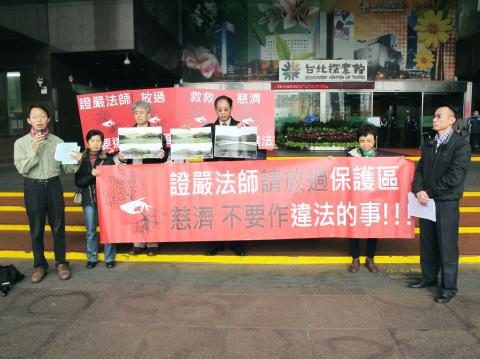Representatives from environmental groups and local residents yesterday gathered in front of Taipei City Hall to present a petition saying that all the buildings on a plot of land purchased by the Buddhist Compassion Relief Tzu Chi Foundation within an environmental conservation area in the city’s Neihu District (內湖) are illegal, a view that the city government said had some validity.
The Tzu Chi Foundation purchased a plot of land on the district’s Chengkong Road Sec 5, across from Dahu Park (大湖公園), and applied to the city government in 1997 to change the land’s status from a environmental conservation area to one that could be used for the construction of a 4.6 hectare “social welfare park.”
The foundation’s plans led to opposition from environmentalists and local residents over concerns that the fragile geological features of the site may not be appropriate for a large-scale development, possible water drainage problems and over fears that the case would become a bad example of giving over environmental conservation areas to development.

Photo: Chen Wei-tzu, Taipei Times
Shouting: “The city government should stop covering up for Tzu Chi, and Tzu Chi should stop its illegal practices,” the protesters urged the city government to admit that the buildings on the land are illegal constructions, and to put a stop to the foundation’s efforts to legalize them or to expand the development.
Neihu Environmental Conservation Area Protection Association chairperson Lee Jih-Ching (李日進) said that according to the city government’s land use regulations for environmental conservation areas, developments larger than 5,000m2 need to go through urban planning and renewal procedures, and construction of buildings more than 200m2 require approval from the city’s urban planning committee, but the foundation did not fulfill either of these requirements.
Pan Han-shen (潘翰聲) of Green Party Taiwan, said the city government should not neglect the fact that the existing buildings in the area are illegal and should take action accordingly.
Receiving the petition from the groups’ representatives, Construction Management Office deputy director Chen Huang-cheng (陳煌城) said: “According to our records, there are indeed illegal constructions in the area, but operations to tear them down are on hold.”
The city government passed an administrative order some years ago that allowed illegal constructions built before 1994 to be exempted from being torn down, Chen said, adding that the office would check whether there are new illegal constructions in the area within the next two weeks.

Alain Robert, known as the "French Spider-Man," praised Alex Honnold as exceptionally well-prepared after the US climber completed a free solo ascent of Taipei 101 yesterday. Robert said Honnold's ascent of the 508m-tall skyscraper in just more than one-and-a-half hours without using safety ropes or equipment was a remarkable achievement. "This is my life," he said in an interview conducted in French, adding that he liked the feeling of being "on the edge of danger." The 63-year-old Frenchman climbed Taipei 101 using ropes in December 2004, taking about four hours to reach the top. On a one-to-10 scale of difficulty, Robert said Taipei 101

Taiwanese and US defense groups are collaborating to introduce deployable, semi-autonomous manufacturing systems for drones and components in a boost to the nation’s supply chain resilience. Taiwan’s G-Tech Optroelectronics Corp subsidiary GTOC and the US’ Aerkomm Inc on Friday announced an agreement with fellow US-based Firestorm Lab to adopt the latter’s xCell, a technology featuring 3D printers fitted in 6.1m container units. The systems enable aerial platforms and parts to be produced in high volumes from dispersed nodes capable of rapid redeployment, to minimize the risk of enemy strikes and to meet field requirements, they said. Firestorm chief technology officer Ian Muceus said

MORE FALL: An investigation into one of Xi’s key cronies, part of a broader ‘anti-corruption’ drive, indicates that he might have a deep distrust in the military, an expert said China’s latest military purge underscores systemic risks in its shift from collective leadership to sole rule under Chinese President Xi Jinping (習近平), and could disrupt its chain of command and military capabilities, a national security official said yesterday. If decisionmaking within the Chinese Communist Party has become “irrational” under one-man rule, the Taiwan Strait and the regional situation must be approached with extreme caution, given unforeseen risks, they added. The anonymous official made the remarks as China’s Central Military Commission Vice Chairman Zhang Youxia (張又俠) and Joint Staff Department Chief of Staff Liu Zhenli (劉振立) were reportedly being investigated for suspected “serious

Nipah virus infection is to be officially listed as a category 5 notifiable infectious disease in Taiwan in March, while clinical treatment guidelines are being formulated, the Centers for Disease Control (CDC) said yesterday. With Nipah infections being reported in other countries and considering its relatively high fatality rate, the centers on Jan. 16 announced that it would be listed as a notifiable infectious disease to bolster the nation’s systematic early warning system and increase public awareness, the CDC said. Bangladesh reported four fatal cases last year in separate districts, with three linked to raw date palm sap consumption, CDC Epidemic Intelligence